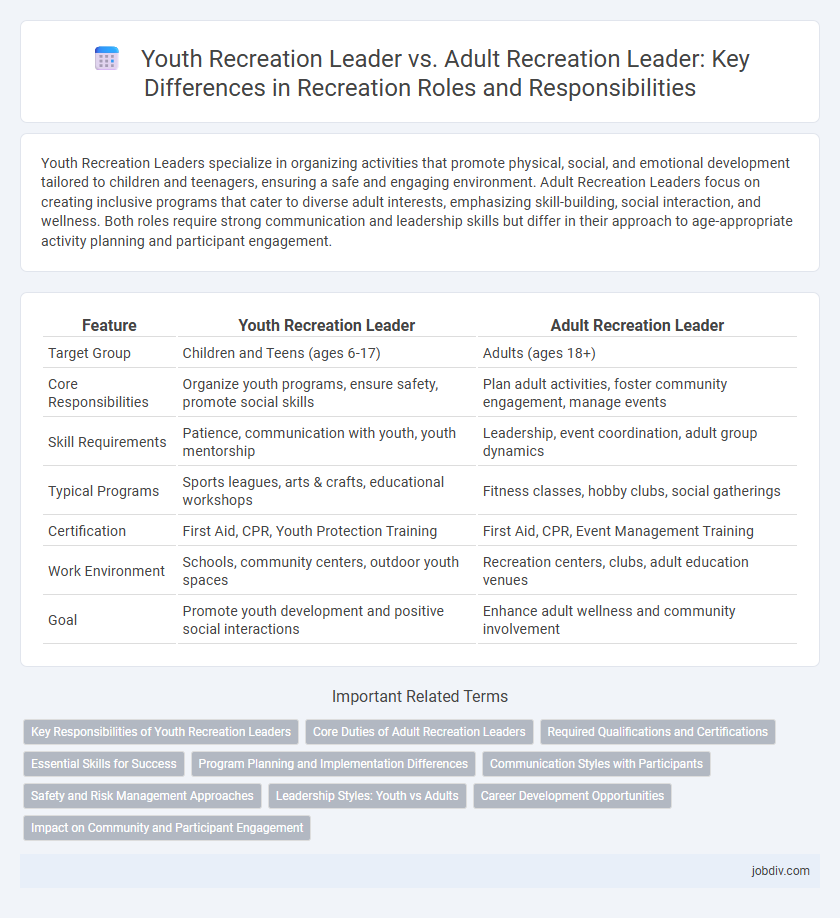Youth Recreation Leaders specialize in organizing activities that promote physical, social, and emotional development tailored to children and teenagers, ensuring a safe and engaging environment. Adult Recreation Leaders focus on creating inclusive programs that cater to diverse adult interests, emphasizing skill-building, social interaction, and wellness. Both roles require strong communication and leadership skills but differ in their approach to age-appropriate activity planning and participant engagement.
Table of Comparison
| Feature | Youth Recreation Leader | Adult Recreation Leader |
|---|---|---|
| Target Group | Children and Teens (ages 6-17) | Adults (ages 18+) |
| Core Responsibilities | Organize youth programs, ensure safety, promote social skills | Plan adult activities, foster community engagement, manage events |
| Skill Requirements | Patience, communication with youth, youth mentorship | Leadership, event coordination, adult group dynamics |
| Typical Programs | Sports leagues, arts & crafts, educational workshops | Fitness classes, hobby clubs, social gatherings |
| Certification | First Aid, CPR, Youth Protection Training | First Aid, CPR, Event Management Training |
| Work Environment | Schools, community centers, outdoor youth spaces | Recreation centers, clubs, adult education venues |
| Goal | Promote youth development and positive social interactions | Enhance adult wellness and community involvement |
Key Responsibilities of Youth Recreation Leaders
Youth Recreation Leaders facilitate engaging, age-appropriate activities that promote social, emotional, and physical development among children and adolescents. They design and implement programs that encourage teamwork, leadership skills, and positive peer interaction while ensuring a safe and inclusive environment. Youth Recreation Leaders also monitor participants' behavior, provide guidance, and support individual growth to foster lifelong healthy habits.
Core Duties of Adult Recreation Leaders
Adult Recreation Leaders specialize in organizing and supervising recreational activities tailored for adult participants, ensuring accessibility and engagement for diverse age groups. Their core duties include program planning, resource management, and facilitating social interaction to promote physical, mental, and emotional well-being among adults. They often collaborate with community organizations and health professionals to develop inclusive, safe, and enriching recreational environments.
Required Qualifications and Certifications
Youth Recreation Leaders typically require certifications in CPR and First Aid, along with experience in child development or youth programming; a background in education or social work is often preferred. Adult Recreation Leaders generally need certifications in fitness training, group facilitation, and experience in adult education or therapeutic recreation. Both roles may require state-specific recreation professional licenses and continuing education to maintain up-to-date knowledge of safety standards and recreational best practices.
Essential Skills for Success
Youth Recreation Leaders excel in communication, empathy, and creativity to engage and inspire children and teenagers effectively. Adult Recreation Leaders require strong organizational skills, conflict resolution, and leadership abilities to manage diverse adult groups and ensure safety. Both roles demand adaptability, teamwork, and a passion for fostering community wellness through recreational activities.
Program Planning and Implementation Differences
Youth Recreation Leaders design programs that emphasize skill development, teamwork, and age-appropriate activities tailored to children and teenagers, often incorporating educational and social growth elements. Adult Recreation Leaders focus on creating inclusive, diverse activity options that accommodate varying fitness levels, personal interests, and social engagement for mature participants. The implementation for youth involves structured supervision and safety protocols, while adult leaders facilitate flexible, self-directed participation promoting autonomy and community connection.
Communication Styles with Participants
Youth Recreation Leaders utilize energetic, clear, and motivational language tailored to engage younger participants, often incorporating interactive techniques and visual aids to maintain attention. Adult Recreation Leaders adopt a more collaborative, respectful communication style, focusing on active listening and verbal cues to address the diverse interests and maturity levels of adult participants. Both roles require adaptability, but youth leaders emphasize encouragement and enthusiasm while adult leaders prioritize inclusivity and thoughtful dialogue.
Safety and Risk Management Approaches
Youth Recreation Leaders implement stringent safety protocols tailored to the developmental needs and behavioral patterns of minors, emphasizing close supervision, age-appropriate activities, and proactive risk assessments to prevent injuries. Adult Recreation Leaders prioritize comprehensive risk management strategies that address diverse physical abilities and health concerns, incorporating emergency preparedness training and adaptive safety measures for varied participant populations. Both roles require adherence to regulatory standards and continuous safety education, but Youth Recreation Leaders focus more on preventive controls, whereas Adult Recreation Leaders emphasize responsive interventions.
Leadership Styles: Youth vs Adults
Youth Recreation Leaders often adopt a participative and motivational leadership style, emphasizing peer collaboration, skill-building, and fostering a sense of belonging to engage younger participants effectively. Adult Recreation Leaders typically utilize a more facilitative and empowering approach, encouraging autonomy, goal-setting, and personal development tailored to mature individuals' interests and capabilities. Understanding these distinct leadership styles enhances program design by aligning strategies with the developmental needs and preferences of youth versus adult participants.
Career Development Opportunities
Youth Recreation Leaders often have specialized opportunities to develop skills in child psychology, program design for younger participants, and leadership in educational settings, enhancing career prospects in schools, youth organizations, and community centers. Adult Recreation Leaders typically focus on developing expertise in adult fitness programs, wellness coaching, and event coordination, which can lead to roles in corporate wellness, senior centers, or recreational therapy. Both career paths offer certifications and advanced training, such as CPR, first aid, and leisure management, that significantly improve employment potential and professional growth.
Impact on Community and Participant Engagement
Youth Recreation Leaders foster community engagement by creating inclusive programs that address the developmental needs of young participants, enhancing social skills and promoting healthy lifestyles. Adult Recreation Leaders impact community involvement by organizing diverse activities that encourage lifelong participation and intergenerational connections, strengthening community bonds. Both roles contribute significantly to participant engagement by tailoring experiences to their target age groups, maximizing enjoyment and personal growth.
Youth Recreation Leader vs Adult Recreation Leader Infographic

 jobdiv.com
jobdiv.com